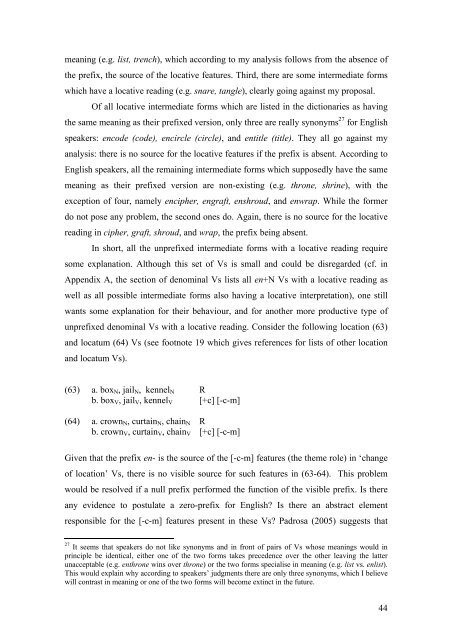Prefixation in English and Catalan - Departament de Filologia ...
Prefixation in English and Catalan - Departament de Filologia ...
Prefixation in English and Catalan - Departament de Filologia ...
Create successful ePaper yourself
Turn your PDF publications into a flip-book with our unique Google optimized e-Paper software.
mean<strong>in</strong>g (e.g. list, trench), which accord<strong>in</strong>g to my analysis follows from the absence of<br />
the prefix, the source of the locative features. Third, there are some <strong>in</strong>termediate forms<br />
which have a locative read<strong>in</strong>g (e.g. snare, tangle), clearly go<strong>in</strong>g aga<strong>in</strong>st my proposal.<br />
Of all locative <strong>in</strong>termediate forms which are listed <strong>in</strong> the dictionaries as hav<strong>in</strong>g<br />
the same mean<strong>in</strong>g as their prefixed version, only three are really synonyms 27 for <strong>English</strong><br />
speakers: enco<strong>de</strong> (co<strong>de</strong>), encircle (circle), <strong>and</strong> entitle (title). They all go aga<strong>in</strong>st my<br />
analysis: there is no source for the locative features if the prefix is absent. Accord<strong>in</strong>g to<br />
<strong>English</strong> speakers, all the rema<strong>in</strong><strong>in</strong>g <strong>in</strong>termediate forms which supposedly have the same<br />
mean<strong>in</strong>g as their prefixed version are non-exist<strong>in</strong>g (e.g. throne, shr<strong>in</strong>e), with the<br />
exception of four, namely encipher, engraft, enshroud, <strong>and</strong> enwrap. While the former<br />
do not pose any problem, the second ones do. Aga<strong>in</strong>, there is no source for the locative<br />
read<strong>in</strong>g <strong>in</strong> cipher, graft, shroud, <strong>and</strong> wrap, the prefix be<strong>in</strong>g absent.<br />
In short, all the unprefixed <strong>in</strong>termediate forms with a locative read<strong>in</strong>g require<br />
some explanation. Although this set of Vs is small <strong>and</strong> could be disregar<strong>de</strong>d (cf. <strong>in</strong><br />
Appendix A, the section of <strong>de</strong>nom<strong>in</strong>al Vs lists all en+N Vs with a locative read<strong>in</strong>g as<br />
well as all possible <strong>in</strong>termediate forms also hav<strong>in</strong>g a locative <strong>in</strong>terpretation), one still<br />
wants some explanation for their behaviour, <strong>and</strong> for another more productive type of<br />
unprefixed <strong>de</strong>nom<strong>in</strong>al Vs with a locative read<strong>in</strong>g. Consi<strong>de</strong>r the follow<strong>in</strong>g location (63)<br />
<strong>and</strong> locatum (64) Vs (see footnote 19 which gives references for lists of other location<br />
<strong>and</strong> locatum Vs).<br />
(63) a. boxN, jailN, kennelN R<br />
b. boxV, jailV, kennelV [+c] [-c-m]<br />
(64) a. crownN, curta<strong>in</strong>N, cha<strong>in</strong>N R<br />
b. crownV, curta<strong>in</strong>V, cha<strong>in</strong>V [+c] [-c-m]<br />
Given that the prefix en- is the source of the [-c-m] features (the theme role) <strong>in</strong> ‘change<br />
of location’ Vs, there is no visible source for such features <strong>in</strong> (63-64). This problem<br />
would be resolved if a null prefix performed the function of the visible prefix. Is there<br />
any evi<strong>de</strong>nce to postulate a zero-prefix for <strong>English</strong>? Is there an abstract element<br />
responsible for the [-c-m] features present <strong>in</strong> these Vs? Padrosa (2005) suggests that<br />
27 It seems that speakers do not like synonyms <strong>and</strong> <strong>in</strong> front of pairs of Vs whose mean<strong>in</strong>gs would <strong>in</strong><br />
pr<strong>in</strong>ciple be i<strong>de</strong>ntical, either one of the two forms takes prece<strong>de</strong>nce over the other leav<strong>in</strong>g the latter<br />
unacceptable (e.g. enthrone w<strong>in</strong>s over throne) or the two forms specialise <strong>in</strong> mean<strong>in</strong>g (e.g. list vs. enlist).<br />
This would expla<strong>in</strong> why accord<strong>in</strong>g to speakers’ judgments there are only three synonyms, which I believe<br />
will contrast <strong>in</strong> mean<strong>in</strong>g or one of the two forms will become ext<strong>in</strong>ct <strong>in</strong> the future.<br />
44
















